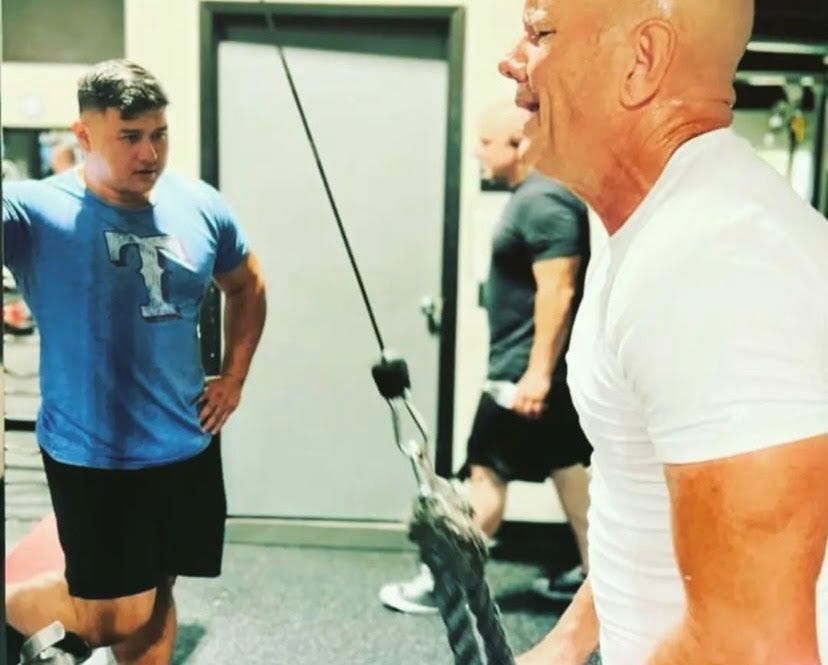Aaron Conner
Head Instructor
1830 I-30 Frontage Rd, Rockwall, TX 75087 // Questions? Call us: (469) 863-1024
At Rockwall's Fitness Sanctuary, you will discover your true potential and master the art of excellence in both body and mind. Our training will challenge you to grow stronger, sharper, and more confident with every session.

At Rockwall's Fitness Sanctuary, you will discover your true potential and master the art of excellence in both body and mind. Our training will challenge you to grow stronger, sharper, and more confident with every session.
At Rockwall's Fitness Sanctuary, you will discover your true potential and master the art of excellence in both body and mind. Our training will challenge you to grow stronger, sharper, and more confident with every session.
Embark on your wellness journey with our meticulously designed personal training program, tailored to evaluate your fitness level, stimulate your motivation, and provide expert instruction for a truly personalized health experience. Our program is not just about transforming bodies, but also about fostering a mindset that prioritizes health and well-being, ensuring your journey towards better fitness is as unique as you are.
Empower yourself with our Women’s Group X Training classes, where you'll experience a dynamic fusion of fitness, camaraderie, and targeted workouts designed to elevate your strength, confidence, and overall well-being, all in a supportive community that understands the challenges of balancing family and personal growth.
Experience the art and discipline of judo in our invigorating classes. Discover the power of technique, resilience, and personal growth as you join us on a journey of self-improvement and camaraderie.
Our Kids jiu-jitsu program is simply fantastic! Your little ones will pick up amazing techniques that will help them triumph in any ground battle. Whether they're joining for fun, self-defense or both, they're sure to have an amazing time and make some great buddies on the mats.
Whether you want to learn self-defense, compete in tournaments, or simply have fun, our Brazilian jiu jitsu program will teach you the most effective grappling techniques and strategies to dominate any opponent on the ground.
Elevate your child's special day with an action-packed martial arts-themed birthday party, blending exciting activities, expert guidance, and memorable moments that leave kids energized and parents delighted, all in a uniquely tailored experience that transforms celebrations into lifelong memories.
Embark on a transformative adventure this summer with our Martial Arts-themed camp, where your child will discover discipline, self-confidence, and teamwork while engaging in exciting activities that fuse martial arts training with character-building experiences, ensuring they return home not just with memories, but with invaluable life skills that last a lifetime.
Embark on a transformative journey at our Rockwall, Texas Fitness & Jiu jItsu classes, where tradition intertwines with innovation. Our academy stands as a bastion of discipline and personal growth, rooted in the values of respect and determination. From young enthusiasts to seasoned adults, our diverse programs provide a platform to build confidence, mental resilience, and lasting connections within a tight-knit community. Experience the fusion of centuries-old teachings with modern techniques, and let our school become your sanctuary for holistic development through the art of martial combat.
Fitness and Brazilian Jiu Jitsu not only impart fighting skills but also equip you with the ability to thrive in challenging circumstances. By mastering the art of self-defense through a range of techniques and tactics, you'll possess life-saving knowledge applicable in any situation.
At the core of our sessions, you will discover yourself completely absorbed, cultivating a sharper intellect, and embracing moments of deep mental clarity, fostering a tranquil sanctuary amidst life's turbulence.
By engaging in fitness and Jiu Jitsu, you will discover a powerful remedy for stress. Through precise techniques and fluid movements, your mind will gain clarity and find a path to tranquility. Moreover, the physical exertion will stimulate the release of endorphins, those uplifting agents that invigorate your mood.
Engaging in Fitness & Brazilian Jiu Jitsu offers a transformative avenue to elevate your holistic physical fitness, encompassing an array of dynamic movements, purposeful strength conditioning, and invigorating cardiovascular exercises that synergistically cultivate enhanced strength, flexibility, and a renewed embodiment of optimal vitality.
Embarking on the quest for fitness excellence will grant you a steadfast wellspring of confidence, as you master the skill of creating and achieving goals, conquering both physical and mental challenges, and relying on your instincts to lead you down a victorious path.
Join our gym and become part of a thriving community where camaraderie flourishes. Connect with like-minded individuals who share your aspirations, fostering meaningful relationships and interactions. Experience the invaluable bonds that will ignite your dedication and drive to excel in your training.
Secure your spot & get started today with our TOP SECRET online web special!
*By opting into the web form above you are providing consent for Legends Fit to send you periodic text messages and emails. Standard rates may apply. You may opt-out anytime by replying STOP.
Embark on a Journey of Transformation Beyond Technique: Our classes go beyond boundaries, instilling values that mold warriors of honor, empathy, and perseverance. Enter a Universe of Purpose, where each punch shapes principles, and every kick resounds with respect. Elevate yourself, reveal your potential, and unleash excellence on a one-of-a-kind journey.
Unlock Infinite Possibilities: Witness the Growth of Young Minds into Fearless Leaders and Radiant Stars. Embark on a Transformative Journey that Turns Ordinary Lives into Extraordinary Tales of Triumph and Bravery. Your Child's Fate Awaits, Right at Our Doorstep.

Matt B

Michael R

Nicole D

Ally B

Revolutionize Your Fitness Journey
Embrace the power to transform your health with our comprehensive personal training program. It is specifically designed to evaluate, motivate, and guide you towards a personalized fitness journey. Let us empower you to create a fitness experience that is both educational and inspiring, tailored just for you.

GroupX: The Future of Fitness!
Witness the transformation of fitness regimes with GroupX, our innovative group fitness program tailored to suit all fitness levels. Immerse yourself in a variety of class offerings - from calming yoga sessions to adrenaline-pumping high-intensity interval training. Be part of our dynamic community that's at the forefront of defining fitness trends for the coming decade.

Mini Warriors: Ignite the Martial Spirit in Your Kids!
In our innovative Kids Martial Arts program, young learners delve into a world of discipline, building unwavering confidence, honing focus, and gaining self-defense skills that foster both physical and mental growth. Through dynamic training, they develop resilience, leadership qualities, and a sense of camaraderie that accompanies them beyond the mat, ensuring a journey marked by achievement and personal development.

FlowJitsu: Unleash Your Inner Grappler with Brazilian Jiu Jitsu!
Elevate your combat prowess through our Brazilian Jiu Jitsu class, a transformative blend of grappling techniques, mental acuity, and physical conditioning that cultivates self-discipline, camaraderie, and mental fortitude. Experience the art of strategic submission and positional dominance while enhancing flexibility, building lean muscle, and fostering resilience—a holistic journey that not only enriches your mind and body but also empowers you with real-world self-defense expertise.

Master the Art of 8 Limbs
Venture into the heart of Muay Thai, a time-honored martial art that harmoniously blends agility, raw power, and strategic finesse. In our all-encompassing classes, discover how to deliver formidable punches, kicks, knee strikes, and elbow blows with lethal precision, while also mastering the art of clinching. Whether you're a novice or a battle-hardened veteran, we invite you to ignite your warrior spirit and redefine your limits here with us.

Kid Warriors: Summer Quest of Martial Arts Mastery!
Embark on an extraordinary summer adventure with our Martial Arts Summer Camp, where physical prowess merges with character development, and kids discover the joy of discipline and teamwork. As they engage in exhilarating activities, learn essential self-defense techniques, and forge lifelong friendships, they'll gain confidence, focus, and a sense of accomplishment that will stay with them far beyond the summer sunsets.

Ignite Your Judo Journey: Join Our Empowering Judo Program!
Explore the amazing world of our Judo classes! Get a taste of balance, discipline, and self-defense in an atmosphere filled with passion and camaraderie. Unleash your potential, embrace the journey, and see the incredible power of judo for yourself.
See some of our most common questions and answers below, or call us at (469) 863-1024
Beginning a Jiu Jitsu program can be daunting, but there's nothing to worry about! A beginner's class typically includes an introduction to the basics, including basic grappling, sweeps, and stances. The focus is on developing fundamental skills that serve as a foundation for future training.
Before your first class, you should wear comfortable clothes that allow you to move freely. You should arrive early and introduce yourself to the instructor and other students. You should follow the instructions and rules of the class and ask for help if you need it.
Although any sport or activity has some risk involved, our team of certified instructors follow safety protocols to ensure a safe and supportive environment for our students. In fact, unlike sports which has one adult supervising an entire team, we have multiple instructors monitoring a room at all times making sure everything runs smoothly. We understand that each student has their own unique limits and we encourage rest and feedback during exercise.
For your first few classes, comfortable workout clothes like a T-shirt and sweatpants or shorts are appropriate. Once you decide to commit to a specific martial art, you will need to purchase the appropriate uniform and any necessary protective gear.
Because we place such a huge focus on safety and injury prevention, we're proud to say that injuries are very few and far between with our program. In fact, because martial arts gets you in great shape, and makes you strong and flexible, people often see LESS injuries in their lives.
Consistency is key to progress in any martial arts program. We recommend attending classes at least two to three times a week to build a strong foundation and continually develop your skills.
Experience a Transformational Adventure in Empowerment as Our Gym Provides Students with Essential Self-Defense Skills, Empowering Them to Safeguard Themselves and Their Loved Ones in Real-Life Situations.
Embark on an Empowering Journey as Our Gym Equips Students with Practical Self-Defense Techniques, Empowering Them to Safeguard Themselves and Their Loved Ones in Real-Life Situations.